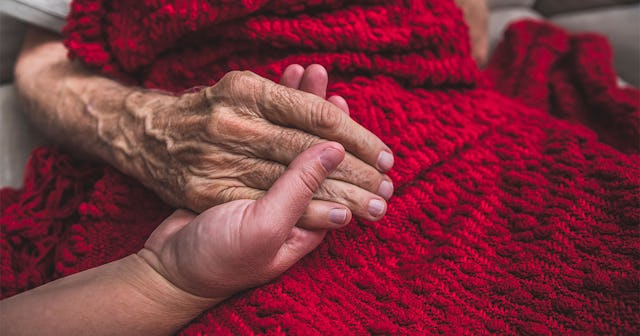Grieving Before Death: The Truth About Anticipatory Grief

The first time I grieved the loss of my mother was in 2016. I was sitting in my therapist’s office beside a small table lamp and a pile of toys. Puppets and figures and coloring sheets sat in a wooden crate. Some were piled neatly on a bookcase, awaiting children to see them. To touch them and play with them. Children like my two-year-old daughter, who was lying on her stomach in the middle of the floor. I was talking about the parents I wanted and needed. The mother that I (as a new mother) yearned for. And I was angry. Sad. Depressed, though admittedly there was also acceptance and hope. I felt stronger, ready to move forward and move on.
“Well, that makes sense,” my therapist said. “Because you’re grieving. You’re grieving the loss of the parent you want but will never have. It’s a process,” she added. “A normal reaction and response. But you understand that, right? You know what you’re experiencing is grief?”
“No,” I said, because I didn’t. I was very much taken aback. Why? Because my mother was, at that time, alive. Grief is for those who have passed, I thought. But my mother was still walking. She was still talking and breathing, and yet I was mourning her absence. It was 9:00 a.m. on a Tuesday and I was lamenting her “loss.” But that is because grief and loss are complicated, and because my mother was complicated.
You see, my mother was sick. Very sick. She lived with an undiagnosed (and untreated) mental illness, and had for many years. I watched as depression stole her identity and slowly eroded her mind. My mother was physically unwell; she didn’t shower or bathe or care for herself. Her overgrown toenails and weakened muscles kept her from walking. There were bedsores on her shoulder blades and calves and backside, and she was an alcoholic. Every day, I watched her die. And it was exhausting. On this particular morning, I’d had enough. I realized I needed to let go.
What is anticipatory grief?
“Anticipatory grief, or grief that occurs before death, is common among people who are facing the eventual death of a loved one or their own death,” an article on Verywell Mind explains. “While most people are familiar with the grief that occurs after a death (conventional grief), anticipatory grief is not often discussed… this type of loss often goes unrecognized [and] it can be brought upon by many factors: mental illness, alcohol or drug abuse, brain injury, and dementia being among the most common.” It occurs when someone has a disease, injury, or condition that permanently changes their personality.
“Regardless of the factors involved, it [anticipatory grief] is both confusing and debilitating,” the article continues. Having to face the fact that a loved one is no longer psychologically the same as who you always knew them to be is hard. It is upsetting and painful, and the loss, while not physical, is still real.
What are the signs and “symptoms?”
While the signs and “symptoms” of anticipatory grief are similar to those experienced during the traditional grief process, the emotions tend to occur more sporadically.
“The emotions that accompany anticipatory grief are similar to those which occur after a loss but can be even more like a roller coaster at times,” the article on Verywell Mind explains. “Some days may be really hard. Other days you may not experience grief at all.” What’s more, “you might have anxiety, dread, or sadness as you wait for their passing,” an article on WebMD explains. “Anger, bitterness, even resentment are common feelings, too, [especially] as you’re forced to come to terms with the fact that you can’t change the outcome.”
Other signs you are and/or may be experiencing anticipatory grief include:
- Sadness or tearfulness
- Loneliness
- Hopelessness
- An overwhelming sense of dread or fear
- Anxiety
- Irritability or anger
- Shame
- Guilt
- Sleeplessness and/or fatigue
- Loss of appetite
- Loss of interest in normal activities
What can you do if you think you are experiencing anticipatory grief?
Whether you are grieving “traditionally” or experiencing anticipatory grief doesn’t matter: Grief is grief is grief. For that reason, it should be handled in a conventional manner.
“Finding a friend or another loved one you can share your feelings openly with is extremely helpful,” Verywell Mind explains. Working with a mental health professional and/or grief counselor is important, as both are trained to help move you through this process. And, in some cases, psychiatric medications may be used, especially if your grief is complicated and leads to secondary conditions.